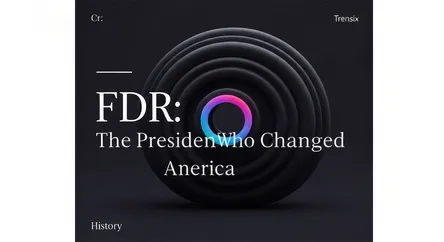History
FDR: The President Who Changed America

An overview of Franklin D. Roosevelt, the 32nd U.S. President who led the nation through the Great Depression and World War II with his New Deal.
What is it?
Franklin Delano Roosevelt, often called FDR, was the 32nd President of the United States, serving an unprecedented four terms from 1933 until his death in 1945. He is a central figure in 20th-century history for guiding the U.S. through two of its greatest crises: the Great Depression and World War II. In response to the economic collapse, Roosevelt implemented a series of programs and reforms known as the New Deal, which aimed to provide relief, recovery, and reform. This included establishing key agencies and social safety nets like Social Security, the Securities and Exchange Commission (SEC), and the Federal Deposit Insurance Corporation (FDIC). During World War II, he was a principal leader of the Allied forces, instrumental in the strategy against the Axis powers and in laying the groundwork for the United Nations.
Why is it trending?
Franklin D. Roosevelt remains a perpetually studied and referenced figure due to the sheer scale of his impact on American society and government. His presidency fundamentally redefined the role of the federal government in the lives of its citizens and in the national economy. Discussions about the scope of government power, social welfare programs, and economic regulation often draw comparisons to Roosevelt's New Deal policies. Furthermore, his leadership during a period of global crisis offers enduring lessons in statesmanship, communication through his "fireside chats," and international diplomacy, making him a relevant subject during contemporary economic and political challenges.
How does it affect people?
The legacy of Franklin D. Roosevelt's presidency is deeply embedded in the fabric of modern American life. Programs born from the New Deal continue to provide crucial support for millions. Social Security offers financial assistance to retirees, the disabled, and bereaved families. The FDIC insures bank deposits, protecting citizens' savings and maintaining financial stability. Labor laws enacted during his tenure established rights for workers, including the 40-hour work week and the minimum wage. On a global scale, his role in founding the United Nations continues to influence international relations and diplomacy. Roosevelt's expansion of presidential power and the federal government set a precedent that has shaped the nation's political landscape to this day.